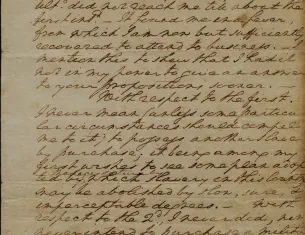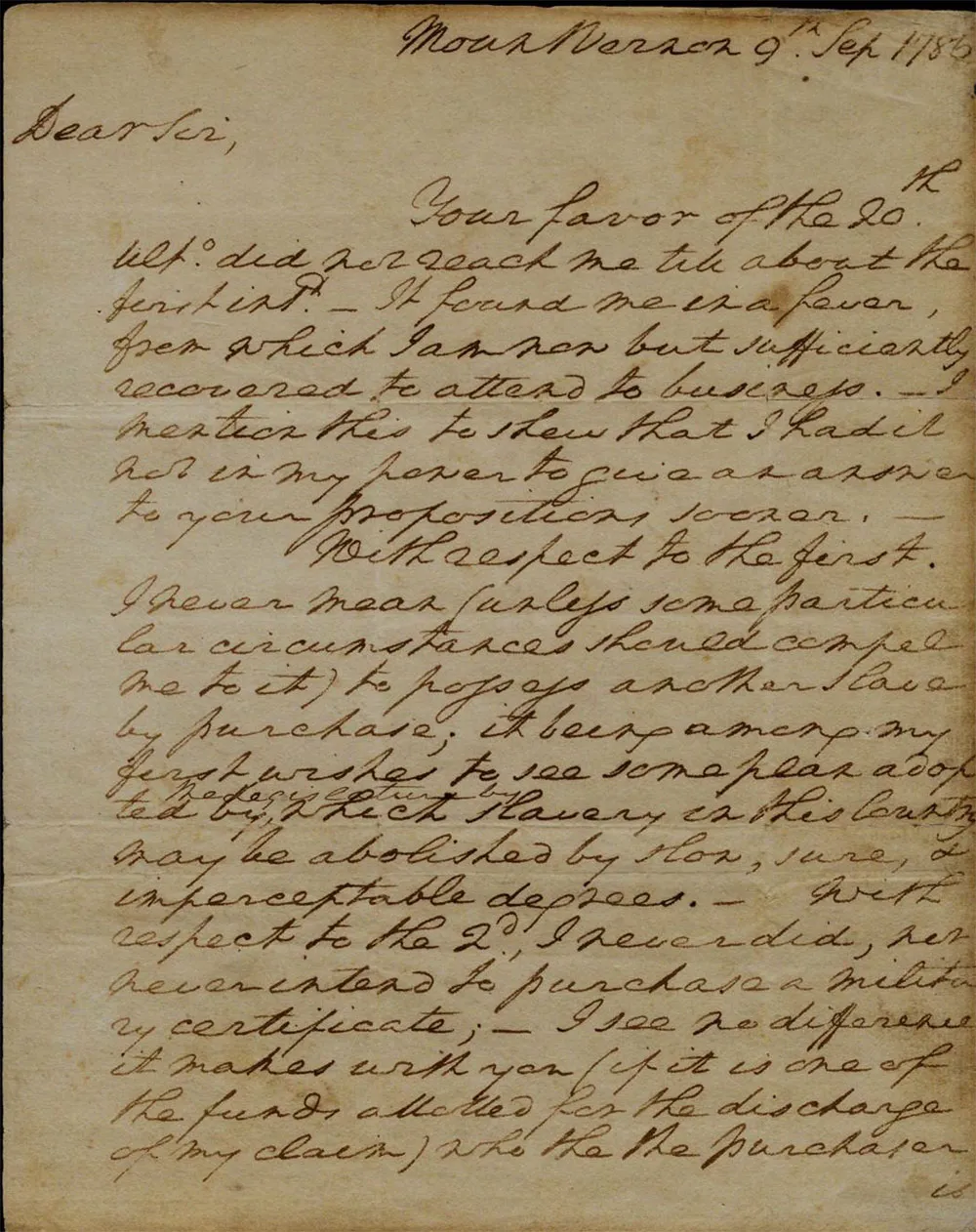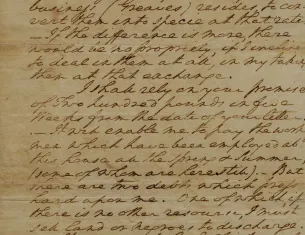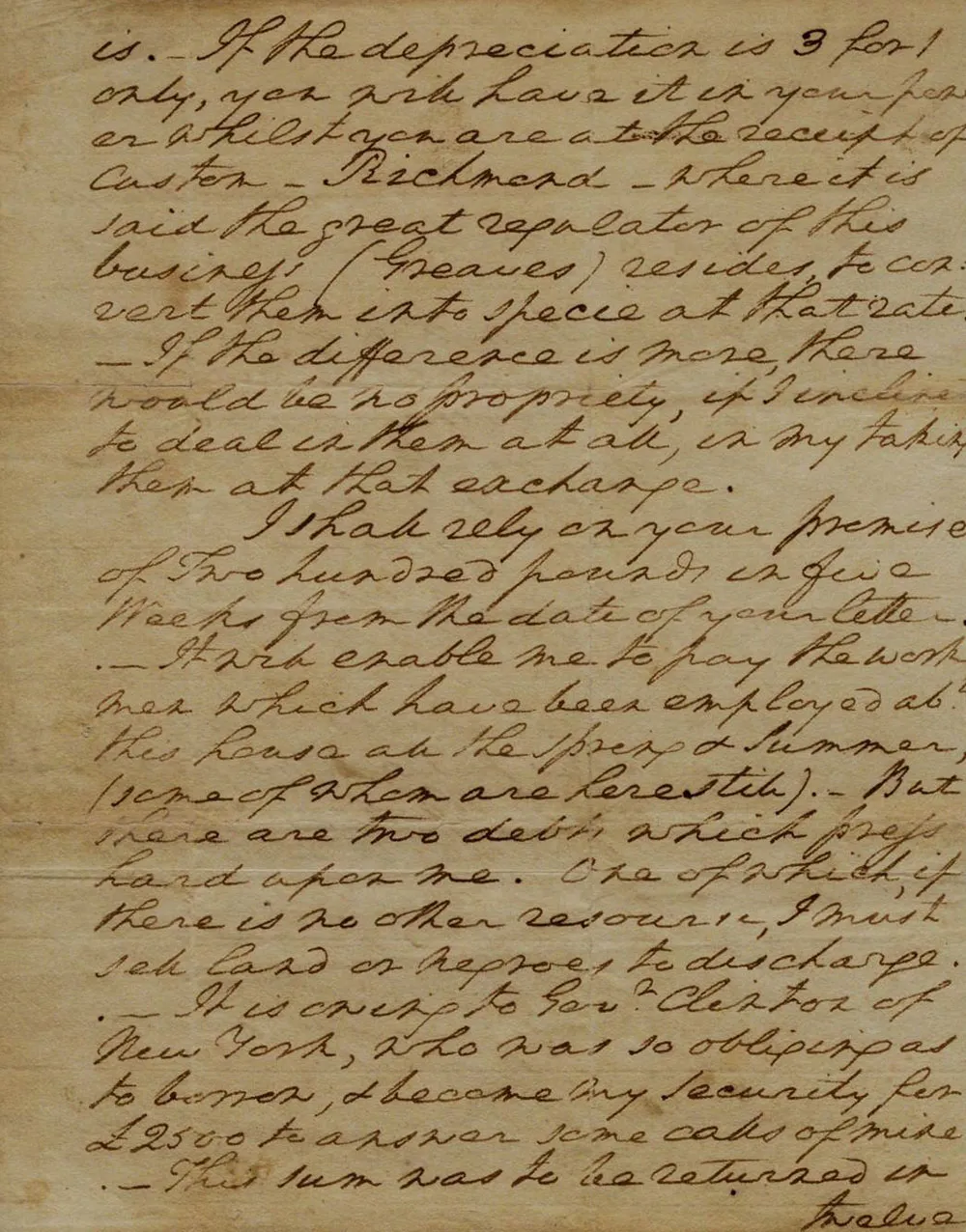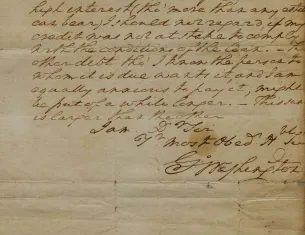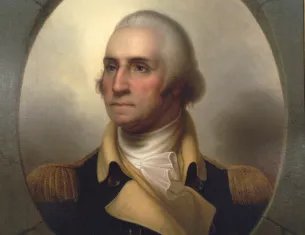George Washington on the Abolition of Slavery, 1786
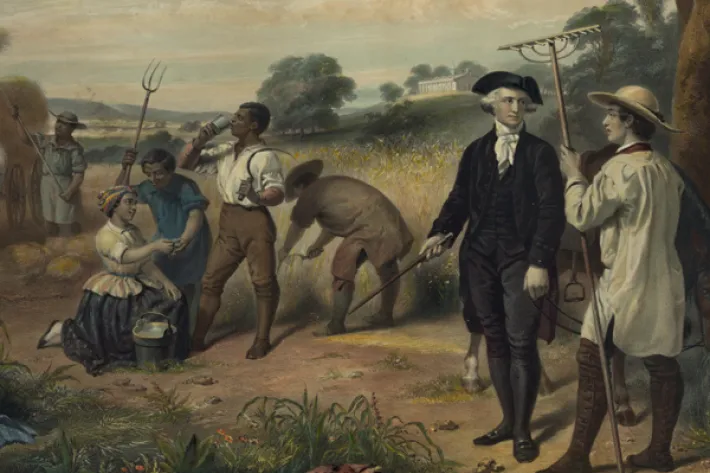
"Life of George Washington—The Farmer,” Junius Brutus Stearns, Paris, 1863. (Library of Congress)
Of the presidents who were slaveholders, only George Washington freed all his own slaves upon his death. Washington gradually came to realize that slavery was immoral and contrary to the Revolutionary ideals of liberty and equality. In 1774 he endorsed a document, known as the Fairfax Resolves, that condemned the slave trade as “unnatural” and recommended that no more slaves be imported into the British colonies. Five years later, he approved a plan to grant slaves their freedom in exchange for service in the Continental Army. Washington never spoke out publicly against slavery. But in this private letter to fellow Virginian John Mercer, dated September 9, 1786, Washington expresses his hope that slavery would be abolished.
A Letter from George Washington to John F. Mercer, September 9, 1786
Mount Vernon 9th. Sep 1786
Dear Sir,
Your favor of the 20th. ulto. did not reach me till about the first inst. – It found me in a fever, from which I am now but sufficiently recovered to attend to business. – I mention this to show that I had it not in my power to give an answer to your propositions sooner. –
With respect to the first. I never mean (unless some particular circumstances should compel me to it) to possess another slave by purchase; it being among my first wishes to see some plan adopted by, The Legislature by which slavery in this Country may be abolished by slow, sure, & imperceptable degrees. – With respect to the 2d., I never did, nor never intend to purchase a military certificate; – I see no difference it makes with you (if it is one of the funds allotted for the discharge of my claim) who the the purchaser is. – If the depreciation is 3 for 1 only, you will have it in your power whilst you are at the receipt of Custom – Richmond – where it is said the great regulator of this business (Greaves) resides, to convert them into specie at that rate. – If the difference is more, there would be no propriety, if I incline to deal in them at all, in my taking them at that exchange.
I shall rely on your promise of Two hundred pounds in five Weeks from the date of your letter. – It will enable me to pay the work men which have been employed abt. this house all the Spring & Summer, (some of whom are here still). – But there are two debts which press hard upon me. One of which, if there is no other resource, I must sell land or negroes to discharge. –It is owing to Govr. Clinton of New York, who was so obliging as to borrow, & become my security for £2500 to answer some calls of mine. – This sum was to be returned in twelve months from the conclusion of the Peace. – For the remains of it, about Eight hundred pounds york Cy. I am now paying an interest of Seven prCt.; but the high interest (tho' more than any estate can bear) I should not regard, if my credit was not at stake to comply with the conditions of the loan. – The other debt tho' I know the person to whom it is due wants it, and I am equally anxious to pay it, might be put of a while longer. – This sum is larger than the other
I am. Dr Sir
Yr. Most Obedt. Hble Sert
Go: Washington
Source: George Washington to John Mercer, September 9, 1786, The Gilder Lehrman Institute of American History, GLC03705.
A Letter from George Washington to John F. Mercer, September 9, 1786
Mount Vernon 9th. Sep 1786
Dear Sir,
Your favor of the 20th. ulto. did not reach me till about the first inst. – It found me in a fever, from which I am now but sufficiently recovered to attend to business. – I mention this to show that I had it not in my power to give an answer to your propositions sooner. –
With respect to the first. I never mean (unless some particular circumstances should compel me to it) to possess another slave by purchase; it being among my first wishes to see some plan adopted by, The Legislature by which slavery in this Country may be abolished by slow, sure, & imperceptable degrees . . .
I shall rely on your promise of Two hundred pounds in five Weeks from the date of your letter. – It will enable me to pay the work men which have been employed abt. this house all the Spring & Summer, (some of whom are here still). – But there are two debts which press hard upon me. One of which, if there is no other resource, I must sell land or negroes to discharge . . . The other debt tho' I know the person to whom it is due wants it, and I am equally anxious to pay it, might be put of a while longer. – This sum is larger than the other
I am. Dr Sir
Yr. Most Obedt. Hble Sert
Go: Washington
Source: George Washington to John Mercer, September 9, 1786, The Gilder Lehrman Institute of American History, GLC03705.
Background
Of the presidents who were slaveholders, only George Washington freed all his own slaves upon his death. Washington gradually came to realize that slavery was immoral and contrary to the Revolutionary ideals of liberty and equality. In 1774 he endorsed a document, known as the Fairfax Resolves, that condemned the slave trade as “unnatural” and recommended that no more slaves be imported into the British colonies. Five years later, he approved a plan to grant slaves their freedom in exchange for service in the Continental Army. Washington never spoke out publicly against slavery. But in this private letter to fellow Virginian John Mercer, dated September 9, 1786, Washington expresses his hope that slavery would be abolished.
Transcript
A Letter from George Washington to John F. Mercer, September 9, 1786
Mount Vernon 9th. Sep 1786
Dear Sir,
Your favor of the 20th. ulto. did not reach me till about the first inst. – It found me in a fever, from which I am now but sufficiently recovered to attend to business. – I mention this to show that I had it not in my power to give an answer to your propositions sooner. –
With respect to the first. I never mean (unless some particular circumstances should compel me to it) to possess another slave by purchase; it being among my first wishes to see some plan adopted by, The Legislature by which slavery in this Country may be abolished by slow, sure, & imperceptable degrees. – With respect to the 2d., I never did, nor never intend to purchase a military certificate; – I see no difference it makes with you (if it is one of the funds allotted for the discharge of my claim) who the the purchaser is. – If the depreciation is 3 for 1 only, you will have it in your power whilst you are at the receipt of Custom – Richmond – where it is said the great regulator of this business (Greaves) resides, to convert them into specie at that rate. – If the difference is more, there would be no propriety, if I incline to deal in them at all, in my taking them at that exchange.
I shall rely on your promise of Two hundred pounds in five Weeks from the date of your letter. – It will enable me to pay the work men which have been employed abt. this house all the Spring & Summer, (some of whom are here still). – But there are two debts which press hard upon me. One of which, if there is no other resource, I must sell land or negroes to discharge. –It is owing to Govr. Clinton of New York, who was so obliging as to borrow, & become my security for £2500 to answer some calls of mine. – This sum was to be returned in twelve months from the conclusion of the Peace. – For the remains of it, about Eight hundred pounds york Cy. I am now paying an interest of Seven prCt.; but the high interest (tho' more than any estate can bear) I should not regard, if my credit was not at stake to comply with the conditions of the loan. – The other debt tho' I know the person to whom it is due wants it, and I am equally anxious to pay it, might be put of a while longer. – This sum is larger than the other
I am. Dr Sir
Yr. Most Obedt. Hble Sert
Go: Washington
Source: George Washington to John Mercer, September 9, 1786, The Gilder Lehrman Institute of American History, GLC03705.
Excerpt
A Letter from George Washington to John F. Mercer, September 9, 1786
Mount Vernon 9th. Sep 1786
Dear Sir,
Your favor of the 20th. ulto. did not reach me till about the first inst. – It found me in a fever, from which I am now but sufficiently recovered to attend to business. – I mention this to show that I had it not in my power to give an answer to your propositions sooner. –
With respect to the first. I never mean (unless some particular circumstances should compel me to it) to possess another slave by purchase; it being among my first wishes to see some plan adopted by, The Legislature by which slavery in this Country may be abolished by slow, sure, & imperceptable degrees . . .
I shall rely on your promise of Two hundred pounds in five Weeks from the date of your letter. – It will enable me to pay the work men which have been employed abt. this house all the Spring & Summer, (some of whom are here still). – But there are two debts which press hard upon me. One of which, if there is no other resource, I must sell land or negroes to discharge . . . The other debt tho' I know the person to whom it is due wants it, and I am equally anxious to pay it, might be put of a while longer. – This sum is larger than the other
I am. Dr Sir
Yr. Most Obedt. Hble Sert
Go: Washington
Source: George Washington to John Mercer, September 9, 1786, The Gilder Lehrman Institute of American History, GLC03705.
